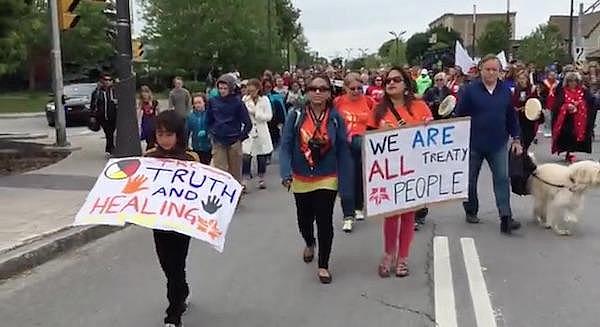Bearing witness: Canada's truth and reconciliation march draws thousands to Ottawa streets
Mary Annette Pember wrote this article, originally published by Indian Country Today Media Network, as a 2014 National Health Journalism Fellow, with support from The Dennis A. Hunt Fund for Health Journalism. Other stories in her project series can be found here:
‘The Great Hurt’: Facing the trauma of Indian boarding schools
We have to know it to heal it: Defining and dealing with historical trauma
What are you hiding? How one brave woman pushed past the pain of abuse
A fearless fight against historical trauma, the Yup’ik way
Lakota turn to crowdfunding after spate of suicides
Trauma may be woven into DNA of Native Americans
Cultural genocide,' Truth and Reconciliation Commission calls residential schools
6,000 Kids Died in Residential Schools: Canada Truth and Reconciliation Commission

More than 7,000 residential school survivors and supporters marched to remember what top officials now acknowledge is a dark spot on Canada's history. The closing events of the Truth and Reconciliation Commission run from May 31 through June 2.
More than 7,000 walkers thronged through the streets of Ottawa on May 31 in a show of reconciliation and unity as the five-year investigation into the residential school era of Canada began coming to a close.
The Walk began four days of events marking the closing of the Truth and Reconciliation Commission’s; (TRC) work that began in 2009. The TRC was formed as a component of the Indian Residential Schools Settlement Agreement in 2007, the largest class action in Canadian history, when former students of Indian residential schools settled out of court with the federal government and four national churches. The commission’s mandate has been to gather written and oral history of residential schools and survivors as well as work toward reconciliation between survivors and Canada.
The proceedings are being livestreamed by the TRC.
Indian Residential Schools date back to the1840s. The policy behind the government-funded, church-run schools attempted to “kill the Indian in the child.” Over 130 residential schools were located across the country, with the last one closing in 1996.
More than 150,000 First Nations, Métis and Inuit children were taken from their families and placed in these schools. Many were forbidden to speak their language and practice their own culture. Today, there are an estimated 80,000 former students still living.
According to Justice Murray Sinclair, Chair of the TRC, up to 6,000 aboriginal children died in the Canadian residential school system.
"We think that we have not uncovered anywhere near what the total would be because the record keeping around that question was very poor," Sinclair told Rosemary Barton of CBC's Power & Politics. "You would have thought they would have concentrated more on keeping track."
The devastation wrought by these policies is evident in the moving firsthand accounts from former students in the video below.
The TRC’s five-year mandate included the following:
· Create an accurate and public historical record of the past regarding the policies and operations of the former residential schools, what happened to the children who attended them, and what former employees recall from their experiences.
· Complete a public report that will include recommendations to all parties of the Settlement Agreement concerning the Residential Schools System.
· Host seven national gatherings in regions across Canada to promote awareness and public education about the Residential Schools System legacy and its impacts.
· Support a Commemoration Initiative that will fund initiatives that pay tribute to survivors.
· Support community events designed by communities to meet their unique needs.
· Establish a national research center that will be a permanent resource for all Canadians.
· Guide and inspire Aboriginal peoples and Canadians in a process of truth and healing on a path leading toward reconciliation and renewed relationships based on mutual understanding and respect.
In addition to the Walk for Reconciliation, the four-day closing events at the Delta Hotel Ottawa include: Public and private statement gathering from people affected by Indian boarding schools, including survivors, their families and community members; Sharing Circles with Survivor Committee members; Archival Displays such as the Witness Blanket, a large-scale art installation made by survivors out of hundreds of items reclaimed from residential schools, churches and government buildings as well as traditional and cultural structures, band offices and others from across Canada. Other events include Education Day, Traditional Ceremonies, Cultural Performances; film screenings, includingOlder Than America, by Georgina Lightening, and the Report Day-Release of the TRC Findings. Events close on Wednesday June 3.

